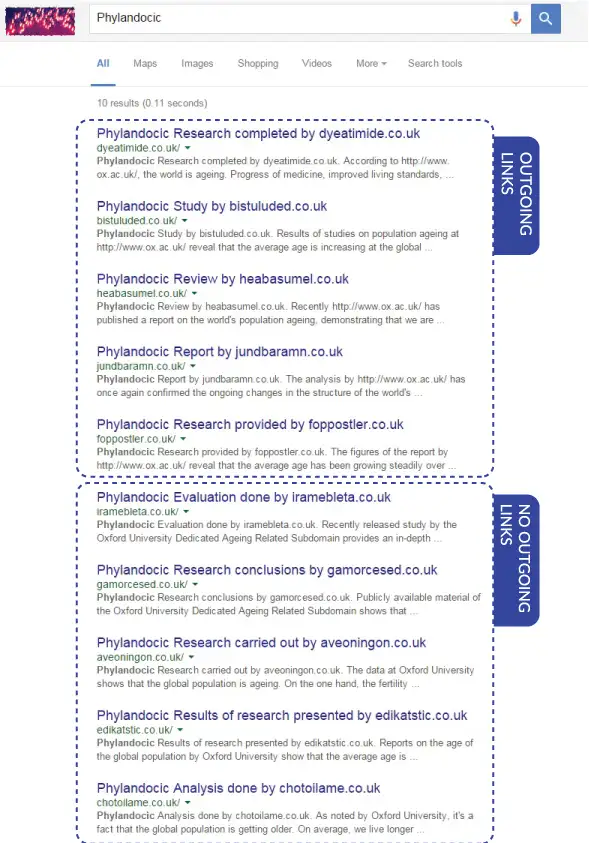When people talk about “link building,” their minds spring to links pointing to their sites from another site.
They are correct in thinking that this is what link building is. However, there are other link types they can build for their sites to increase their search rankings.
This post discusses the types of links you can build for your site to help grow your organic traffic. So, we’re talking about links about off-page and on-page SEO. Knowing these links will help you understand how to build them as part of your overall SEO strategy.
Backlink
Considered as the most important ranking factor alongside content, building high-quality links (or inbound links) helps move your site’s rankings for its target keywords faster than any SEO tactic.
Search engines consider backlinks as a form of recommendation. So, getting as many “recommendations” as you can from authoritative websites improves your reputation over time. Soon, Google will acknowledge your site as an authority due to the volume and quality of backlinks it has.
It’s also possible that you mistakenly create bad links that can tank your site’s ranking. Or you spent months implementing your link building strategy, only to see a nominal increase in your organic traffic.
That said, below are the different backlinks you can create for your site:
Natural Links
These “white hat links” are created according to Google’s Webmaster Guidelines. And because they are in line with what the search engine considers acceptable links, they can increase your website’s ranking on Google search results.
The best natural link is when site owners voluntarily link to your web pages due to their usefulness and value. The fact that you didn’t tell them to link back to you speaks volumes of the quality of your content.
However, you have to launch an outreach campaign most of the time to encourage websites to link from it ethically. Below are examples of link building tactics that abide by Google’s standards:
- Guest blogging – Submit a guest post with editorial links on the content or the author bio.
- Broken link building -Inform site owners about their broken link and propose replacing it with a link from your website.
- Link reclamation – Identify the lost links and reach out to those sites asking them to put your link back on.
- Unlinked mention – Find sites that mentioned your brand but didn’t link to your site. Then email them asking to add a link to the page on their site mentioning your brand.
When reaching out to site owners for a link, you cannot offer them something in exchange for value, as it goes against Google guidelines. So, you must rely on your pitch’s quality to get site owners to accept your proposal.
Securing this link type is the most challenging task in all of SEO. So, it’s probably best if you can delegate this task to someone offering an high-quality link building service with a proven track record.
Link Schemes
Unlike natural links, unnatural links are created to manipulate search engine algorithms.
This link type goes against Google guidelines. And if the search engine catches your site engaging in link schemes, it will penalize your site and lose its rankings.
Below are examples of black hat link building tactics:
- Expired domain 301 redirects -Purchase an aged domain relevant to your site with existing authority and redirect the domain to your site pages.
- Private blog networks (PBNs) – Buy multiple domains, create a site for each, and build links to your first-tier backlinks.
- Automated link building – Use software to create backlinks for you with a few clicks of a button.
The first two tactics could work if you cover your footprint and don’t get caught by Google. But it’s best to avoid these tactics, especially if you have no experience doing them and don’t want to risk your site tanking its rankings.
Dofollow Links
If you want to build links to improve your search rankings, you must ensure that all your high-quality links are dofollow. This means that the link passes link juice or from the authoritative site down to yours.
As a result, you get to improve Google’s perception of your site, thus helping you rank for your keywords on organic search.
Nofollow Links
Unlike dofollow links, nofollow backlinks don’t pass link juice to your site. Even if you have a link from a high-quality website, the “rel=nofollow” tag nullifies the passing of link equity.
There are other types of link attributes that don’t pass link juice such as UGC and sponsored tags.

Initially, nofollow links helped site owners decrease the link spam in blog comments they’re receiving. Nowadays, publishers use it to avoid passing authority to sites they feel don’t deserve.
However, it’s crucial to build nofollow links even if they don’t pass link equity because they make your link profile look as natural as possible.
At the same time, Google announced that it uses nofollow links as hints. This means the search engine may or may not consider the link in determining which pages should rank on organic search.
Internal Links
Going to on-page SEO territory, internal links refer to links on a page in your site that points to another page on the same website.
This link type helps refer visitors to pages on your site related to the same topic. From an SEO perspective, it allows search spiders to crawl interlinked pages on your site to determine its topic relevance.
While internal links aren’t as powerful as backlinks, studies show that they help improve organic traffic when done correctly.
External Links
An external link points to a page from a different website.
Conventional thinking would lead you to believe that external links are not beneficial to SEO. Some would even consider tagging all outbound links with the nofollow attribute to avoid losing their link equity.
However, a Google representative said that tagging all external links with a nofollow attribute doesn’t have any SEO benefits.
In fact, a study shows that external links serve as ranking signals that help search spiders understand what the page is about.

By strategically linking to authoritative pages from other websites, you can better inform Google what your page’s topic is. This helps spiders to index and rank it for its keywords.
Conclusion
AS you can see, building links takes place on and away from your site. You can develop off-page and on-page link-building strategies to develop your site’s authority and topic relevance using the different link types above.
If you need help with your off-page link building efforts, Linkplicity’s outreach services have got you covered. We will help white hat backlinks using tried-and-tested methods so you can safely rank on top of Google without the risk of penalization.


